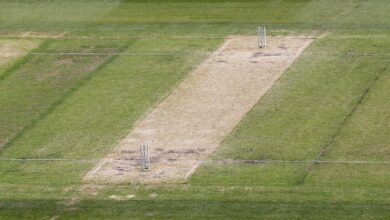How Steve Smith and Travis Head took India’s bowlers apart with their distinctive methods
Both Travis Head and Steve Smith have a style of batting that makes us notice not just the runs they make but how they do it. Both have such distinctive methods. Travis isn’t a throw-the-arms blind hitter, but is calculated. He throws those hands with a method that he has honed rather consciously. Smith did have more than his share of luck but the astonishing thing about his hundred was how went ahead with a new tweak to his method that he put in practice in the nets for three-four days, and trusted it completely.
For an aggressive batsman, Travis was the most secure-looking solid batsman out there. For the more accomplished batsman, Smith was ready to make himself vulnerable with his tweak, and willing to get the job of scoring runs in any fashion.
‘When you’re hot, you’re hot; and when you’re not, you’re not,’ runs the sports maxim, but Smith wasn’t in the mood to agree. It was recorded in these pages a couple of days back, but the tweak is worth reiterating. As one of his initial movements in the stance before the ball is released, he would open up a touch, with both shoulders almost facing the bowler. In the recent past, his hands have been inhibited by the slowness of his hip movements, and the leg-side play has become a touch risky.
In the distant past, he would keep whipping balls from the line of stumps, but all that had recently become areas to target for the opposition. He would try to flick but would be either trapped lbw or get leading edges or even allied with a slow-ish hip movement, he would nick them down the leg. A leg slip had become a place of entrapment.
So, first noticed at an indoor-nets at Allan Border field in Queensland, and further honed in the outdoor nets at the Gabba, he had begun deploying this opening-up tweak. It potentially freed his hands to get the bat in front of pads, or turn the ball to the leg side in a more confident mood. But it also was likely to test him in the line outside off stump if his hands betrayed. As it would a few times early on Sunday.
Off his second ball, after he had opened-up his shoulders, came a full delivery from Akash Deep, who impressed not just with the deliveries but in the way he strung them together through a spell. Smith lunged and flailed and was lucky not to get an edge. There were more instances of him getting beaten, but increasingly the error-window got smaller and smaller. Like that lunge ceased. Then the loose-hands ceased. Later when he got beaten, it wasn’t because of any result of looseness in technique or the mind, but they were genuinely good deliveries.
It was fascinating to see him at work, willing to look ugly, poking and pushing, trying his best to not to extend himself too early. With that opened-stance, in theory, he could have tried to whip and clip the balls more extravagantly but he didn’t. He held himself back, tapping and working the angles. After a while, and especially after Bumrah and Akash were off, he started to press forward with more confidence and energetically, leaning into drives and letting his wrists snap more.
Quiet demolition
All along, Travis was belting the ball rather serenely. Attacking batsmen like him don’t demand unfailing consistency, they can slump every other day, but he is a man of method. Hence it’s not surprising that his good run has extended for 2-3 years. Of late, the areas of past weaknesses are fast eroding.
He had problems against short balls when directed at his body. He had issues when the balls were at his middle and leg, as his leg-side play was anything but fluid. He was seen as an off-side thumper. He had issues in leaning forward fully into his off drives too. Where did all that go? The method ate them.
He has primarily done two things. The way he would hold the bat, almost straight over the stumps, that ended up locking his wrists further, hindering his leg side play. They now come down from wide slips or gully positions, allied with tweaks on how he grips his bat to unlock his wrists. And the way he trusts his position at the crease – crouching on that leg and middle line, almost behind the crease to the pacers. From then he unbends to unleash mayhem. Balls on the off-stump line seem to be like ones with width. He now not only works the ball to the leg side but extends his arms through that line to send the ball either over the infield or plummet powerfully through the leg-side gaps. He does even the upper cuts – as he would repeatedly do against Siraj – differently to others. They are done with a lot of wrist-work kicking in, sending the ball up and over slips. He is a headache for any opposing captain on where to place the fields; slightly unconventional approaches are needed.
For some reason, India abandoned almost completely their round-the-stumps attempts at him. It was the angle, with the ball shaping away late, that got him bowled in Perth. Though he did prosper in Adelaide, the tailing-away balls did cause a few issues. Serenity abounded at Brisbane as India largely struck to the over-the-stumps line and kept bowling straight at him. A better idea would have been to mix both, and he flowed along. The line they adopted at him would have been effective to the Head of the old, but this version 2.0 needs more than that.
Liberated force
A few days back, former Australian captain Tim Paine would note on SEN radio how Head had flourished after Justin Langer’s exit as a coach. “They (Langer and Graeme Hick, who used to be batting coach at one point), were trying really hard for him to work on his defence and it wasn’t the way he wanted to go about it, but he was a young Test player who was trying to impress and trying to stay in the team, so he was trying to please a bit of everyone. I think that’s been the major shift in his output because he is sticking true to the way he wants to play … He doesn’t worry about what (works for others), and I’ve played a little bit with him, he doesn’t care what people think about his technique or how it looks.”
Three years back, when he was out of the Test team, it had come down to between him and Usman Khawaja for a spot in the middle order. The chief selector George Bailey had said as much then. It came down to one game between Khawaja’s Queensland and Head’s South Australia. Both fell for single-digit scores in the first innings on a bowler-friendly pitch, but Khawaja, who was the captain, enforced follow-on. Head responded with a counterattacking 101 that gave him the spot in the Ashes that followed immediately. It was when Head began to turn around his career, and heads began to turn towards him whenever he was batting.
Who can’t but love that moustache and twirl of Head’s bat? Who can’t but love that quirky headspace of Smith, that keeps coming up with solutions?
Why should you buy our Subscription?
You want to be the smartest in the room.
You want access to our award-winning journalism.
You don’t want to be misled and misinformed.
Choose your subscription package






